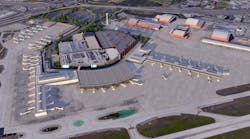... tells AAAE attendees it's time to move past beating each other up over costs and to seek common ground in a continuingly challenging market. "I'm not going to take time to hammer you about costs," Kelly told airport managers who are in Philly this week for the annual meeting of the American Association of Airport Executives.
"I think Southwest Airlines is in good shape," says Kelly, pointing out that the low-fare carrier has recorded 36 consecutive years of profitability. He reports that Southwest has $2.3 billion in cash on hand and "we've got very low levels of debt." Yet, in a market that continues a downward slide, he has concerns. Kelly says that with very few exceptions airports are managing their costs well. The industry has very large problems, he adds, and airlines and airports need to seek new opportunities together.
He says there are three hot buttons on his priority list: 1) attaining optimum flight paths via the NextGen air traffic management system, now under development; 2) finding viable alternative fuels for use in airliners; and 3) a fleet of more efficient aircraft than are in existence today.
Kelly says Southwest is the first airline to commit to installing the necessary equipment to make the carrier's 737 fleet compatible with NextGen - a significant issue. He calls for a national energy policy that is "climate friendly" and reduces U.S. dependence on foreign oil. And, he wants aircraft manufacturers to advance their efforts to find new airframe and engine technologies. While the OEMs have made great strides on that score over the past two decades, says Kelly, there have been few significant advancements in recent years. "That was then and this is now," he says.
Southwest remains interested in expanding its route structure, reports Kelly, but that will likely come at the expense of others - a redirection of resources. The airline also has its eye on international opportunities, initially via code share agreements in Canada, Mexico, and the Caribbean.
One reality: fares will need to go up. Another is, "cost matters."
Meanwhile, the economy remains the top challenge facing airlines and airports, says Kelly. And, because of the impact that a volatile oil market is having, the economics of the airline business has fundamentally changed in the past decade.
A point of order: During the follow-up Q&A, Kelly was asked about getting the airlines (the Air Transport Association) on board with airports' opposition to an ARFF proposal in the recently passed U.S. House bill. It's basically a union/jobs issue, one which could wind up costing airports billions -- needlessly. Kelly evaded an answer ('We'll look into it'). Krys Bart of Reno-Tahoe International Airport pointed out to Kelly that at her airport the figures show that the increased financial burden on her airport would mean a jump of $3 per enplaned passenger for the carriers. It got his attention; and left him silent.
Thanks for reading. jfi



